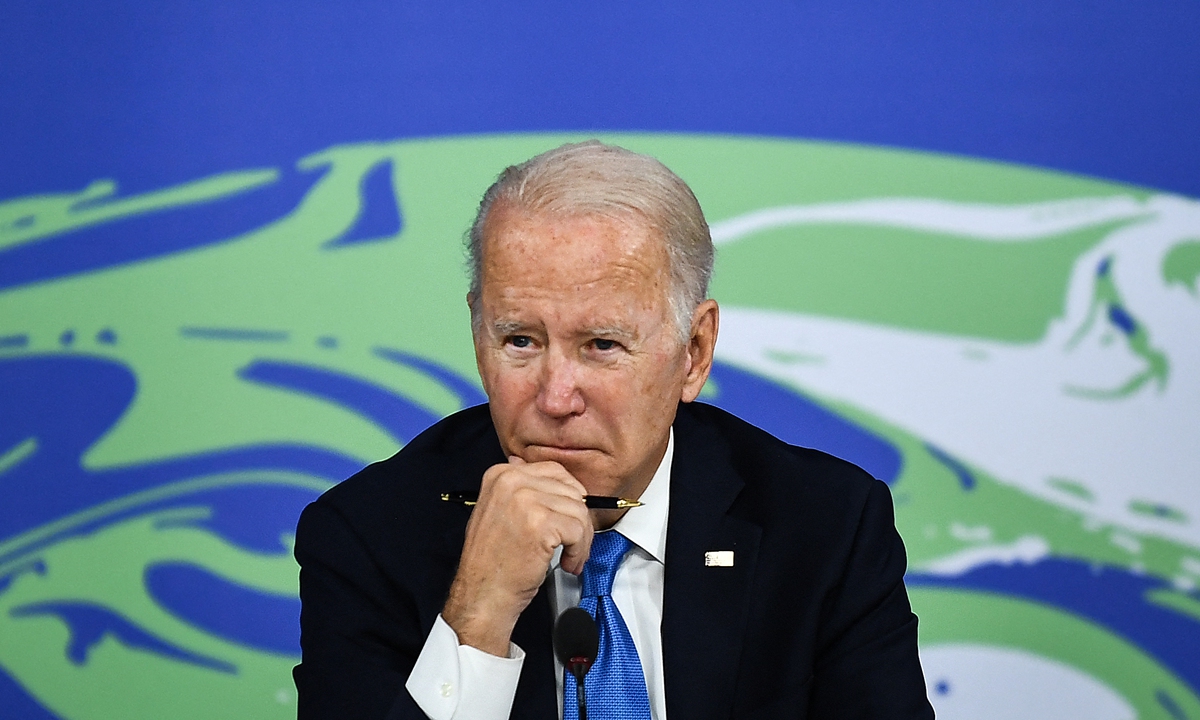US’ B3W infrastructure projects financially unfeasible, bound to fail: experts
BRI’s success combines high standards, China’s national conditions

US President Joe Biden reacts during a meeting on "the Build Back Better World (B3W)", as part of the World Leaders' Summit of the COP26 UN Climate Change Conference in Glasgow, Scotland, on November 2, 2021. Photo: AFP
The US has plans for its first infrastructure projects in January as part of a Group of Seven (G7) initiative touted to counter the China-proposed Belt and Road Initiative (BRI), media reported Monday, in a feeble attempt to seek validation for Washington's existence post-COVID-19.
The US-led G7 initiative known as the Build Back Better World (B3W), essentially a political stunt to challenge the eight-year-old BRI framework and a sly trick played by the Biden administration to build momentum for the passage of the US domestic infrastructure spending package, is financially not feasible, experts said.
They cast doubts over the viability of the colossal spending required to materialize the ulterior motives-powered B3W initiative, particularly when compared with the open and inclusive BRI.
The US eyes investments in five to 10 large infrastructure projects worldwide in January, Reuters reported on Monday, citing an anonymous senior US official.
At least 10 promising projects in Senegal and Ghana were identified during a tour last week by a US delegation led by Daleep Singh, Biden's deputy national security adviser, according to the report.
During a similar tour in early October, a US delegation visited Ecuador, Panama and Colombia, the official said, disclosing that another Asia tour is slated before the end of the year.
The infrastructure projects suggested by the US delegation actually have almost nothing to do with real "infrastructure," a Senegal government source told the Global Times via email on Tuesday.
It remains unknown what amount will be needed for the initial projects under the B3W initiative.
Launched in June as a broader G7 program, the B3W initiative aims to narrow the $40-plus trillion worth of infrastructure needed in the developing world by 2035.

US infrastructure Illustration: Xia Qing/GT
Financial overshoot
The plan goes well beyond the funding capacities of the initiators that have been grappling with their internal infrastructure spending bills, notably the US, as their economies, underpinned by sizable quantitative easing programs, begin tapering pandemic-era stimulus, experts said, revealing the sly intentions unexpressed behind the B3W initiative.
The deal that touts itself as a better alternative to the BRI means almost a destined path to bankruptcy for the B3W membership, Gao Lingyun, an expert at the Chinese Academy of Social Sciences in Beijing, told the Global Times on Tuesday.
The B3W initiative is committed to four areas of focus, "climate, health and health security, digital technology, and gender equity and equality," according to a White House statement in June, envisioning to mobilize private sector capital and catalyze investments from development finance institutions from the G7 and like-minded partners.
In geographic terms, the initiative will range from Latin America and the Caribbean, to Africa and the Indo-Pacific, the statement said.
In light of all the travails the Biden administration has gone through for a $1.2 trillion bipartisan infrastructure bill to be implemented in phases over eight years, which only passed the House on Friday after months of thorny negotiations, the $40 trillion-plus spending, arguably to a large extent on the US, seems impossible at the beginning.
A successful global infrastructure construction plan needs at least three elements - sustainable and massive funding, unshakable determination and the spirit of inclusiveness and mutual respect for partners, and the certainty of internal politics, Lü Xiang, a research fellow at the Chinese Academy of Social Sciences in Beijing, told the Global Times on Tuesday. "The US has none, and the only thing it's good at is to tell a good story by talking big."
The Biden administration can't even realize the goal to renew its domestic infrastructure and has a big problem in funding. "How could it convince Congress to support a $40 trillion global infrastructure plan? And once the Republicans return to the White House and gain control of the Senate and the House in the future, how could it promise its partners the massive plan would be sustained?" Lü said.
The vaguely planned initiative that comes eight years after the BRI was initially proposed but apparently overshoots in funding terms is considered political propaganda to rival the BRI, according to Gao.
The B3W initiative was launched when the Biden administration fought a tough battle in its home turf to get the infrastructure package passed, hinting that the initiative serves as an effective tailwind for the package to eventually get through, he added. He also said that the US government plans to have more businesses glued to the grandly phrased initiative, thus paving the way for its rivalry with China in the global infrastructure push in the post-virus era.
Welcome, and good luck
On the part of the China-proposed BRI that has held onto openness, inclusiveness and transparency and has over the years come into impressive fruition in the BRI markets, the US-led initiative is barely a cause for concern, observers said.
In response to a question about the US-led plan, the Chinese Foreign Ministry said on Tuesday that the space for cooperation in the field of global infrastructure construction is broad, and there is no question of competition between different initiatives.
Wang Wenbin, a spokesperson of the Ministry of Foreign Affairs, said the world needs to "build bridges" rather than "tear down bridges; to strengthen connectivity rather than seeking decoupling; to make mutual-benefits and win-win cooperation rather than a closed-door policy and exclusiveness."
"We hope the US takes concrete actions to push the joint development for all countries."
Wang Yiwei, director of the institute of international affairs at the Renmin University of China, told the Global Times on Tuesday that "there is no need to be worried, and China welcomes any country, including the US, to make credible, inclusive and sustainable actions to help the developing world."
The US and Western countries have emphasized a so-called "high standards or high quality," this is what the BRI has always insisted, "so we welcome their initiative on that. But the point is the high standards need to fit the reality and conditions of developing countries, and this is China's advantage," said Wang Yiwei.
The reason why the BRI is so successful is that China has used its experience in reform and opening-up, which perfectly combined Western high standards and China's national conditions as a developing country, to serve the projects in other developing countries, Wang Yiwei noted.
"So without cooperation from China, the US plan is unlikely to be successful," Wang Yiwei said.
"It's obvious that Biden is busy with various 'boondoggles' and loses attention to the really important issues. He picks senseless fights with countries like China and Russia, while American people look to a competent president who can effectively solve problems in the economy, the COVID-19 pandemic, and immigration," Lü said, noting that this makes the Democrats and Biden face a serious situation in the upcoming midterm election and even the 2024 presidential election.
One year out from the 2022 midterm elections, "58 percent of Americans say President Joe Biden hasn't paid enough attention to the nation's most important problems, as a majority disapproves of the way he's handling his job as President," according to a new CNN Poll
Based on the current facts of US politics and the capability of the US-led G7 bloc, "We know they (the US and its Western allies) are just talking big and we know they want to compete with us, but we still welcome them to help the world together with us for better development. High quality development, infrastructure and inter-connectivity are needed for mankind," Wang Yiwei said.
